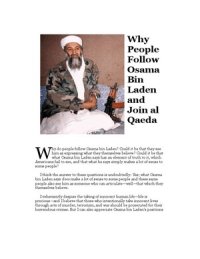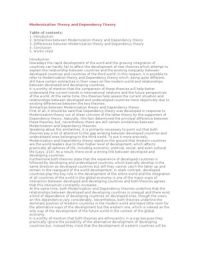(1)To what extent is democracy an integral part of political development? Whywere the political scientists initially reluctant to include democracy in theirdefinitions of political development?
Democracy simply defined means government by the people. All political power is vested directly or through elected officials. By having a system which gives each person a "voice" in the political arena, both honesty and efficiency are promoted. Thisworks in tandem with free and independent forms of mass media. The government istherefore accountable to the people to whom it provides freedom, protection and rights.Elections, along with a strong separation of powers between a Judicial, Legislative andExecutive Branch allows for a system of checks and balances. Democracy advances political development by providing stability. Democracies are generally immune torevolutionary insurrection and less prone than dictatorships to other forms of massviolence. Political scientists were cautious about including democracy in their definitionsof political development because they felt that developing nations were not ready for thisform of government. In addition, most scientists felt that it was unrealistic and perhapsculturally biased to expect liberal democracy to flourish in developing countries.Scientists were also initially reluctant to include democracy in their definitions of political development because they felt that a government did not necessarily have to bedemocratic to be responsive, representative and non repressive. Being concerned with thehigh level of violence and instability in those political systems, they claimed that theLDCs' first priority had to be political stability, even if that might initially requiremilitary rule or other forms of authoritarian forms of government.
(2)Discuss the differences between an electoral democracy, liberal democracyand a substantive democracy. Which definition seems most useful to you?
Electoral democracies are those forms of government that meet the minimal standards to be considered democratic. This type of democracy places a great emphasis on elections.Democracy is almost wholly defined as a political system that holds relatively fair,contested elections, and nearly universal adult suffrage, on a regular basis. Unfortunately,this type of government tolerates human rights violations, manipulation of the massmedia, civil liberties violations and obvious breaches in principles of free society. Insome cases, electoral democracies are also referred to as "semi-democracies"Liberal Democracies are those forms of government where most of the leading officialsare elected. The elections are free of fraud and outside manipulation and there isuniversal suffrage (everyone has the right to vote). All opposing parties have a right to participate and have a chance to be elected to national offices. As well, the governmentrespects the rights of minorities and protects the civil liberties of the people. Theseconstitutionally protected liberties may include: equality before the law, freedom of assembly and religion, freedom of speech, rights to due process, and privacy. Liberaldemocracies tend to be characterized by tolerance and pluralism as well as varying political and social views. Those who hold views that are considered extreme or fringeare allowed to compete on a democratic basis.
Substantive Democracy is a form of government that operates in the best interest of thosegoverned. In such a democracy, equal access to education and health care, regardless of social class or ethnicity, is required. A substantive democracy is the most intense andcomplex form of democracy. This type of democracy allows the general population to play a role in carrying out its political affairs. A Substantive Democracy is also known asa functional democracy.Of the preceding types of democracy the definition of Substantive Democracy seems themost useful to me. Everyone is represented equally and given equal access to publicschooling and health care.
(3)What factors have led to the resurgence of Islamic fundamentalism (orrevivalism) in Afghanistan, Iran and other parts of the Muslim world? Why do youthink so many people in that world admire Osama Bin Laden?
There are many factors that led to the resurgence of Islamic fundamentalism inAfghanistan and other parts of the world. Afghanistan does not have a democraticgovernment, the media manipulates and perverts how Afghanis see the West. The rest of the Muslim world sees the West as the "Great Satan". The Western government and thecitizens of the U.S are portrayed as evil, greedy, ungodly and seeking the subversion of Islam and its followers. This makes a figure like Osama Bin Laden seem heroic when hestages terrorists acts against the U.S. in the name of Jihad (holy war). Islamicfundamentalism gives its believers a great destiny, a noble purpose supported by theCreator of the universe. This ideal is attractive to many especially the young who may beeasily influenced.
Search History:
Result 00 of 00
00 results for result for
p.
Comments
Load more










































